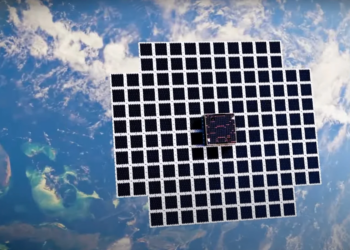Regulations could bolster Europe’s launch industry
EU will dedicate $2.5B to space in 2024
The European Union is working closely with ESA to increase Europe’s independent access to space after a rough year for the region’s launch market.

The EU in its 2024 budget allocated $2.5 billion for space missions, up 4% increase from 2023.
Europe was responsible for just three orbital launches in 2023, compared with the United States’ record 109 launches, and reeled in just $3 billion in revenues, Phil Smith, space industry analyst at analytics and engineering firm BryceTech, told CBN.
Europe’s down year in launch was primarily due to the December 2022 failure of Arianspace’s Vega C rocket and the delay of its Ariane 6 rocket, Smith said.
However, Alain Pajonk, launch manager at OHB SE and project manager for the German Offshore Spaceport Alliance, recently told CBN that another factor may be at play. Regulations may be seen as hurdles to overcome for eager satellite operators looking to expand constellations or services, he said.

A lack of a regulatory framework can slow market growth, which might be the case for Europe’s launch industry, Pajonk said. Establishing launch regulations could prove more critical to restoring Europe’s launch market than building new rockets, despite the known delays with Arianespace’s Ariane 6 and few established alternatives, he added.
“Very soon, the launch bottleneck is going to flip from launch vehicles to launch sites,” Pajonk said. “Constructing a new rocket is one thing, but building a new spaceport along with its environmental licensing and regulatory approval takes a lot of time.”
Maritime launches would offer flexibility not available with onshore launches, and the unpopulated nature of the ocean means a more streamlined regulatory process, Pajonk said.
“The future in European launch is competition,” he said. “Very soon multiple launch solutions will work to deliver even better outcomes for continental launch customers, which naturally are also growing.”
Year of projection for European space policy

European Commissioner for Internal Market Thierry Breton echoed Pajonk’s statements in a speech last month titled “EU space: top priorities for 2024 and beyond.”
“2024 will be a year of projection for the vision we want for Europe about space policy in the next five to 10 years,” Breton said in the speech.
Europe, which has 11 national space laws, fragments the industry and prevents Europe from having a single market in space, Breton said.
Lack of independent access to space is becoming an “acute problem,” Breton said in the post. While Ariane 6 and Vega C entering the market will alleviate some of the problem, more transparency and cooperation between government agencies and launch startups will be required to foster a robust launch market, he said. Rising geopolitical tensions should also motivate the EU to take regulatory measures to keep launches at home, particularly for military missions, he said.
“Working all together in the [EU] framework and under a common goal — it is the only way. This is not against anybody, it is for Europe,” Breton said.
The EU plans to invest $54 million this year in next-generation launchers, he said.
Optimism for European launch
BryceTech’s Smith told CBN that Europe’s launch industry is headed in the right direction.

“I do feel optimistic about Europe’s launch industry. It will likely remain a contributor to the overall global launch industry, though its nature is clearly evolving as certain events have unfolded,” he said, citing the emergence of new launch startups such as Isar Aerospace and Skyora.
Smith expects the European Union to explore new service models regarding launch going forward.
The EU by July plans to launch four German-built Galileo global navigation satellites from U.S. soil via SpaceX Falcon 9 because Germany lacks launch regulations, Pajonk said.
Launching Galileo in the U.S. required a lot of discussions and waivers, Pajonk said. The launch is an exception to Europe’s priorities since the EU decided that strategic European assets must be launched from Europe going forward.
The need isn’t unique to the EU and will be an increasingly urgent priority for military payloads, Pajonk said.
While the satellites will be launched from the “German economic exclusive zone,” the [German Baltic Sea] area is considered international waters, so Germany must comply with the Outer Space Treaty, Pajonk said.
Licensed states at an advantage
Nations already compliant with the Outer Space Treaty might as well establish national launch regulations, Christopher Johnson, space law adviser and project manager at Secure World Foundation, a nonprofit dedicated to space sustainability, told CBN.

The Outer Space Treaty is a multilateral agreement signed in 1967 banning the use of weapons of mass destruction in space and promoting peaceful cooperation in space activities, Catrina Melograna, space lawyer and strategic foresight policy lead at research-driven nonprofit The Aerospace Corp., recently told CBN. The treaty also incorporates principles of the UN Charter, a document signed in 1945 by the United Nations, she said.
“I don’t think there’s really any advantages in not having national space legislation,” Johnson said. “This is because of Article 6 in the Outer Space Treaty — A state is internationally responsible for all of its national space activities, whether those activities are conducted by a national space agency or a private entity.”
Pajonk said that Germany is likely to establish launch licensing in the next couple of years to accommodate Europe’s growing launch interests.
“We know that this is in development, though, as there are multiple launch providers coming to market soon,” Pajonk said. “We’re in touch with the relevant authorities to share information, and we look forward to our demonstration helping legislators make informed decisions for our mutual benefit including standardization decisions.”
Deputy Editor Laurence Russell contributed to this report.









